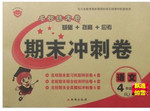题目内容
Tom, as well as his classmates, ________ publicly for their bravery action in time of danger.
A. were praised B. was praised C. have praised D. has praised
B

练习册系列答案
 名校练考卷期末冲刺卷系列答案
名校练考卷期末冲刺卷系列答案
相关题目
题目内容
Tom, as well as his classmates, ________ publicly for their bravery action in time of danger.
A. were praised B. was praised C. have praised D. has praised
B

 名校练考卷期末冲刺卷系列答案
名校练考卷期末冲刺卷系列答案